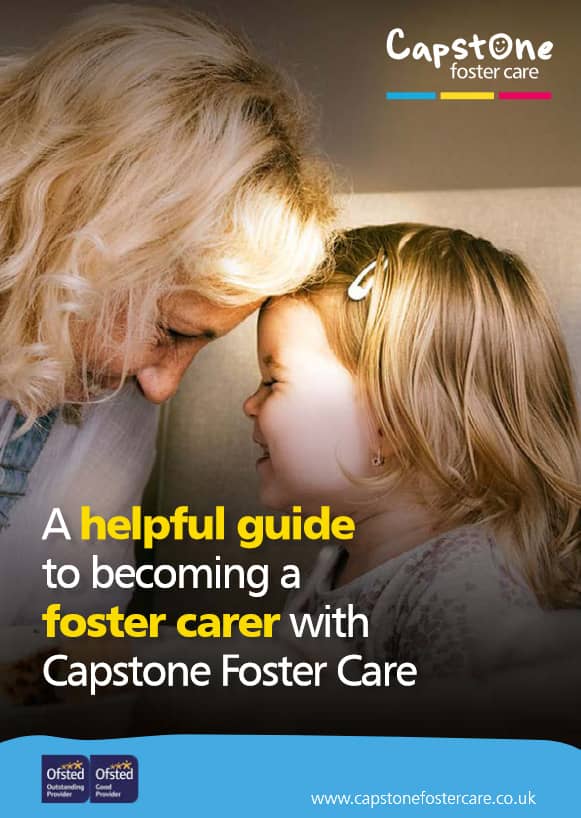


Fostering a disabled child
The role of an independent fostering agency
How to choose a foster care agency
Can I choose who I foster?
What are the benefits of fostering with an independent fostering agency?
What happens when a child is taken into care?
Fostering process: what happens on an initial home visit?
Fostering with local authority vs independent agency
A complete guide to becoming a foster carer
How Are Children in Foster Care Matched with Carers?
Foster Care Budgeting Tips
Becoming A Foster Carer
What is a Care Leaver?
What is a Foster Carer?
Fostering Regulations
How long does it take to become a Foster Carer?
What are the Foster Care requirements?
Changing IFA - Transferring to Capstone
8 reasons why a child may be taken into care
Fostering as a Career
Can you foster if you smoke or vape?
A guide to fostering assessments
LGBTQ+ Fostering
Equality, Inclusion & Anti-discriminatory Practice in Foster Care
What can disqualify you from foster care?
Can you foster if you’re on benefits?
Top transferable job skills to become a foster carer
Fostering as a same sex couple
Fostering while renting
Can you foster if you have mental health issues?
Is there an age limit for fostering in the UK?
Do foster carers get a pension?
How to foster a child: A step by step guide
How do DBS Checks Work?
Can I foster if...?
Mythbusting the top 10 Foster Care Myths
Can I foster if I am disabled?
LGBT Fostering Mythbusting
Can I foster if I have pets?
Can I Foster A Child?
Can I Foster and Work?
Can you Foster with a Criminal Record
Can Single People Foster?
LGBT Family and Foster Care
Fostering across Cultures
Muslim Fostering
Christian Foster Care
Sikh Fostering
Empty Nest Syndrome and Foster Care
Can I Foster?
What is the difference between residential care and foster care?
Fostering Babies and Young Children
What is Kinship Care?
Fostering Babies - Myths
Focusing on Parent & Child Fostering
Fostering Siblings
Fostering Teenagers
Fostering Teenagers - Breaking down the Myths
Fostering Unaccompanied and Asylum Seeking Children
Mother and Baby Foster Placements
Private Fostering
How does therapeutic fostering work?
Young Children Fostering Placements
Difference between short and long-term fostering
Types of self-harm
A Guide to the Foster Care Handbook
Reunification and Birth Parents: A Guide for Foster Carers
What is an EHC Plan? A Guide for Foster Carers
How to prepare a child for becoming a care leaver
Children who foster: impact of fostering on birth children
Fostering LGBTQ+ Youth
How to prepare your home for a foster child
How to help a lonely child: A Guide for Foster Carers
What are the National Minimum Standards for Fostering Services?
10 tips for foster children's education
How to prepare your foster child for secondary school
Tips for coping when foster placements end
Tips for foster parents during Coronavirus
What happens if foster parents get divorced?
5 ways to manage Mother's Day with foster children
Tips for managing foster children's bedtime routines
How to handle foster child bullying
Fostering allowances and the gender pay gap
What discounts can foster carers get?
How to adopt from Foster Care
5 ways to manage Father's Day for children in foster care
8 most common fostering challenges
FosterTalk Membership with Capstone Foster Care
Supporting foster children's contact with birth families
A guide to independent fostering
Keeping Children Safe Online: A Guide For Foster Carers
Movies About Foster Care
Play-based learning strategies for foster carers
A Guide to the Staying Put Program
Why Foster Parent Wellbeing Matters
How to deal with empty nest syndrome
How to recognise signs of depression in foster children
Can you take a foster child on holiday?
Tips and advice on fostering with a disability
10 tips on connecting with your Foster Child
Fostering vs Adoption - What's the difference?
How Fostering can change a future
How to adopt from Foster Care
How to encourage children to read in Foster Care
How to prepare a Foster Child's bedroom
Reading and Storytelling with Babies and Young Children
Supporting Children's Learning
The 20 most recommended books Foster Carers and young people should read
Things you can do when your children leave home
The impact of early childhood traumas on adolescence and adulthood
Anxious Disorders in Foster Children
What is sexual abuse and sexual violence
Foster Child behaviour management strategies
Foster Parent Advice: What to expect in your first year of fostering
Capstone's twelve tips at Christmas
10 celebrities who grew up in Foster Care
Could Millenials be the solution to the Foster Care crisis?
Do you work in Emergency Services?
Form F Assessor and Assessment Training
Foster Care Fortnight
Improving Children's Welfare - Celebrating Universal Children's Day
New Year - New Career - Become a Foster Carer
Young People Charities
For many children in foster care, the end goal is to reunite them with their families. It’s vital that foster parents like you are supportive of this, to make sure that when reunification happens, it’s a smooth transition. Even if the goal of reunification is not currently attainable, your foster child’s birth parents are likely to still be involved in their lives in some capacity, and this may be difficult to navigate. In this guide, we’ll explain what to expect during the reunification process and provide you with strategies to deal with the reunification process and birth parents.
Although we use the term “Birth Parents and Birth Family” in this guide, we understand that families come in all sorts of shapes and sizes and can in this case we use it to also reference adoptive parents, grandparents or other guardians.
Reunification is the desired outcome for most children in foster care. Essentially, reunification is when a child in foster care returns to live with their birth parents or guardians. Usually, when a child is taken into care, a reunification plan is created and worked towards for the length of time that the child is in care.
The child’s best interests are always at the forefront of any decisions that are made in regard to reunification. The reunification process generally consists of the following steps, which are designed to make sure your foster child is safe and happy when they return to their birth family.
The reunification process can be challenging, not only due to the bond between you and your foster child but also due to any unresolved trauma or issues that need to be addressed before your foster child reunites with their birth family. Here at Capstone, we’re with you every step of the way as we provide a wealth of support throughout your fostering journey.
As part of the 1989 Children Act, both local authorities and independent foster agencies are required to support contact with your foster child’s biological family, unless it’s not in the best interest of the child. The amount of interaction between the birth families and the child will depend on a number of factors including;
Continued contact with birth parents can help foster children develop their own sense of identity and self. Regular contact can also help stability, security and continue to help your foster child to build a relationship with their birth family.
Building a relationship with the birth family is a good way to show that you support the reunification. It might be beneficial to send them updates about what your foster child has been up to, this might include any schoolwork that they’re proud of or other achievements.
Try to learn about your foster child’s biological family. Find out what their family tree looks like and the relationships your foster child has with them. Your foster child might have enjoyed cooking with a grandparent or enjoyed playing a video game with their cousins. Make the effort to learn about this and connect with your foster child.
Although the majority of birth parents are likely to feel gratitude towards the foster parents looking after their children, it can sometimes be challenging for biological parents, and they can feel jealousy or resentment. It’s important to ensure any negative feelings or interactions are not reflected onto the child, support and training are available for you to make sure that both you and the birth family understand that you are on the same team, with the child’s best interests at heart.
Creating a clear and open line of communication is valuable in supporting contact with your foster child’s birth family. When talking to your foster child about their family, it’s important to make sure that you speak about them in a positive way to help your foster child develop stronger bonds with their birth family.
Together with social services and the team here at Capstone, you’ll be working with the birth family in order to make sure reunification goes smoothly. If you have any concerns or worries about reunification you can report these to the care team. Working together as team, ensuring you’re on time to appointments and having an approachable demeanour will show the birth family that you’re all on the same side.
Depending on type of foster care you provide, you’ll need to manage the expectations of your foster child. Children in short term or emergency foster care are likely to be reunited with their biological parents relatively quickly. However, in long term foster placements, fostering can often be a permanent solution.
It’s also important to make sure that you acknowledge the effect that reunification might have on yourself and your foster family and understand it might be a difficult process - especially if you’ve developed a meaningful bond with your foster child. However, it’s important to remember the difference you’ve made to your foster child’s life. There is support available for you when foster placements end and by fostering you belong to a community that helps to protect children.
Continuous training and support are always available to you from Capstone when you become a foster parent. And with that, we’ll provide you with everything you need to navigate reunification.
Some of the topics we cover in training include helping children deal with change. We also provide a Multi-disciplinary Assessment Treatment & Therapy Service (MATTS), which provides bespoke mental health support to children at the point of need and includes access to social workers, child psychotherapists and support workers, meaning your foster child never feels alone in navigating their relationship with their birth family.
We also have regular visits and calls from social workers to support you, along with regular group meetings with other foster parents, to help you develop a support network with other carers.
Interested in becoming a foster carer yourself? Or need more information on reunification? Get in touch with a member of our helpful team for more support and advice today.
If you’ve got any questions or would like to find out more about fostering with Capstone, fill out the form below.
An experienced fostering advisor from your local area will then be in touch.

Start the conversation today. Our team of friendly advisors are on hand to answer any foster care questions you may have. We can offer you honest and practical advice that can help you decide if becoming a foster carer is the right path for you.


